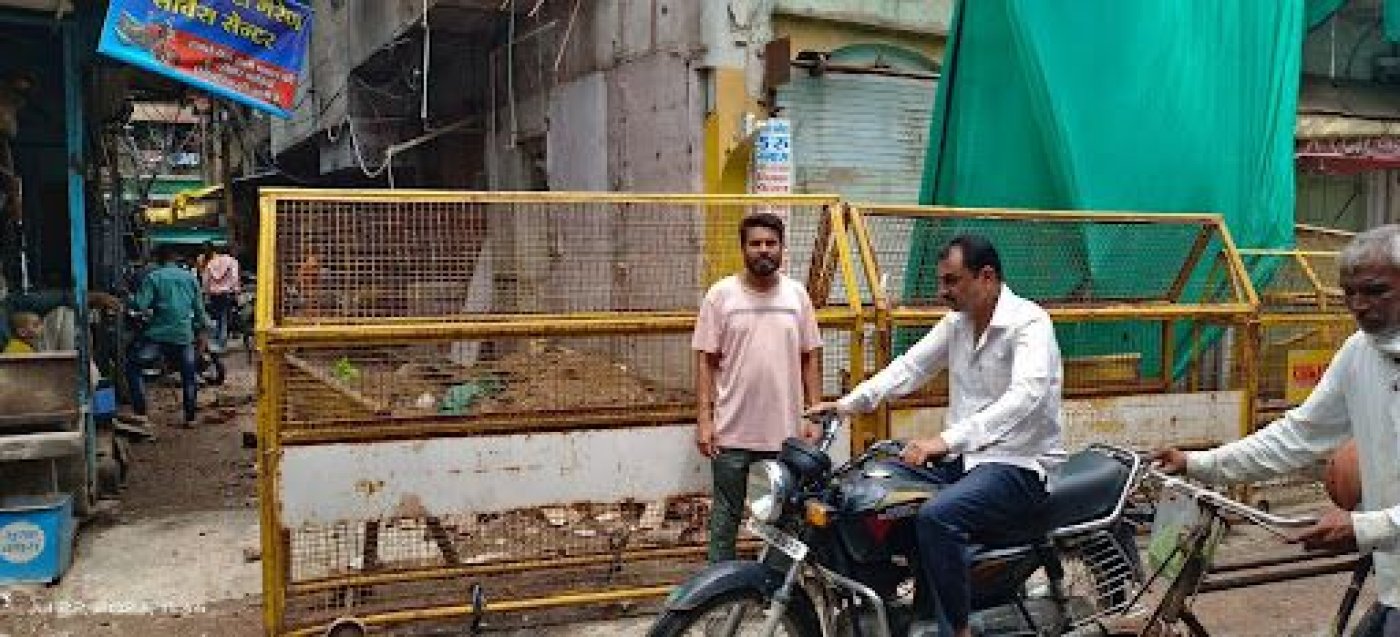BHOPAL: It was around 9 am on 19 July 2023, when Ashraf Hussain Mansoori (43), received a phone call from an officer from the local police station. “Aapke bete ne galat kaam kiya hai, ghar todna padega (Your son has done wrong, your house will have to be demolished),” said the officer.
Half an hour later, at 9:30 am, before Ashraf Hussain could gather his wits about him, a municipal officer pasted a notice on the ground floor of the three-storey building, where he and his two older brothers grew up and where his parents lived, all told for more than half a century.
“This is to inform you that your dangerous construction has not been razed so far,” read the notice pasted to the Mansooris’ gate, addressed to Shahjan Bee, the Mansoori brothers’ mother, who died in 2009. “Thus under section 436 of the Madhya Pradesh Municipalities Act 1961, we are informing you for the last time that you must remove your dangerous building or else the administration will remove it, and you will be liable to pay for the labour charges of the demolition.”
The notice was backdated to 15 July, the phrase “awaidh nirman” or illegal construction scored out and replaced with “khatarnak bhavan” or dangerous building. That, alleged Ashraf Hussain later, was because the building was not illegal. If it was, according to the Madhya Pradesh Municipal Corporation Act, 1956, the government would have to give him 14 days notice and wait for his explanation before further action.
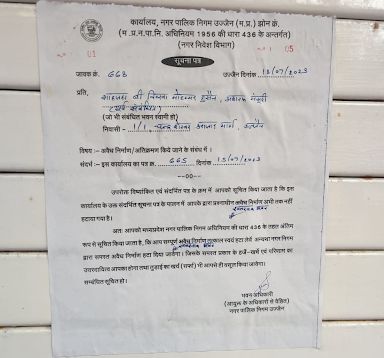
About an hour after the notice was pasted, a bulldozer arrived, accompanied by drummers and a music truck with loudspeakers at Chandrashekhar Azad Lane in Tanki Chowk, a narrow warren of homes and shops where both Muslims and Hindus live.
As the Mansooris and their stupefied families watched, a devotional Hindu song called “Govinda Govinda”, sung by the popular singer Kailash Kher, blared out of the truck, drummers beat their drums, a police posse watched and within two hours, their home—and the little soda and provision store that Ahsraf Hussain ran on the ground floor—was rubble.
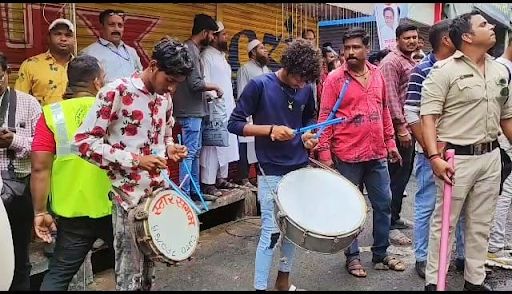
A dozen men, women and children from three families are now homeless, most of whom have no criminal record and have not been accused of a crime.
Those accused of crimes under four sections of the Indian Penal Code, 1860, —section 295-A (deliberate and malicious acts, intended to outrage religious feelings), 153-A (offence committed in place of worship), 296 (disturbing religious assembly) and 505 (statements conducing to public mischief) — were Ashraf’s two sons, aged 18 and 16, and a 16-year-old friend.
Yet, as the police acknowledged, there was no specific criminal act evident, except an unproven allegation from a Hindu group that the three teenagers spat at a Hindu religious procession from the roof of their building on 17 July.
“Badi mehnat se pai pai jod kar yeh ghar banaya tha. Yeh sirf ghar hi nahi hamari rozi roti ka zariya bhi tha (With great effort, saving every paisa, we built this home. This wasn’t just our home but where we made a living),” said Ashraf Hussain, the youngest of the Mansoori brothers.
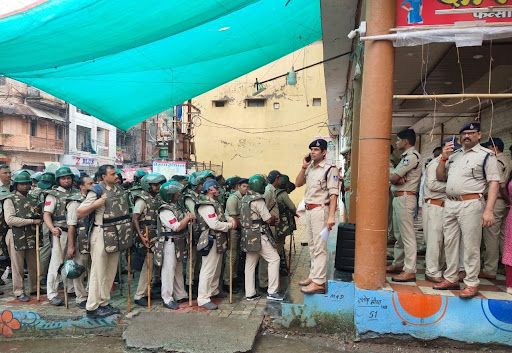
Ashraf Hussain’s family and he were staying with relatives when we spoke to him. “Now, both (home and livelihood) have gone,” he said. “Ab kuch samhaj nahi aa raha kya kare. We don’t know what to do.”
A Demolition Without A Crime Or Due Process
The wrecking of the Mansooris’ building was the latest of more than two dozen such demolitions over the past year, according to municipal officials in Ujjain, a city of 1.99 million in a district where 12% of the population is Muslim, the fourth highest in a state ruled for the last 18 years by the Bharatiya Janata Party (BJP). Out of seven, four legislators here are from the opposition Congress party.
Headed by chief minister Shivraj Singh Chauhan, a once-benign figure who wore Muslim skull caps during Muslim religious events, the state government has embarked on a policy of demolishing homes of alleged wrong-doers without clear evidence of crime or conviction, as in neighbouring Uttar Pradesh, also run by the BJP.
A former high court justice, two former director generals of police and a Supreme Court lawyer that Article 14 spoke to said the arrests of the teens, the drums and the demolition of the Mansooris’ homes did not follow due process and were illegal and violative of the constitution.
The excuse used by the municipal corporation, that the building was “dangerous”, was not backed by evidence, and the statements of various officials were apparently in conflict.
Govt Officials Contradict Each Other, Ignore The Law
Rajveer Singh Gurjar, the inspector of police of the Kharakua police station, under whose jurisdiction the Mansooris’ home falls, told Article 14 the building was “illegal”, even though the municipal notice does not make that allegation.
Article 14 sought comment from municipal commissioner Roshan Kumar Singh but he did not respond to calls and messages over two days. Sahil Maidawala, the corporation’s building officer, who issued the demolition notice, refused to comment and blocked our reporter’s number.
The only municipal officer who did comment was public relations officer Rais Nizami. “I don’t know much about the notice and the demolition,” said Nizami. “But demolition is an ongoing process, and the corporation has razed over two dozen homes over the last year.”
Akash Bhuriya, assistant superintendent of police, who supervised the demolition of the Mansooris’ home, defended the use of drums and a music truck, telling reporters at the site that the law allowed for an announcement (munadi) using drums before the demolition of an illegal property.
“There is no such law that backs the act of using a DJ and drums during demolition,” said former Madhya Pradesh DGP Nandan Dubey. “Munadi is a warning given prior to demolition, giving reasonable time to the respondent to take necessary action.”
Article 14 sought comments over two days from Madhya Pradesh DGP Sudheer Saxena and Ujjain superintendent of police Santosh Kumar Singh, but neither replied to phone calls and messages asking why music and drums were used and what police investigations had revealed. We will update this story if they respond.
Constitutional provisions and laws appear to have been freely breached in the case of the Mansooris, similar to numerous other demolitions, largely of Muslim properties in north India, as Article 14 has reported (here and here).
‘Such Malafide Actions Have No Place In Law:’ Former Justice
Supreme Court advocate Shah Rukh Alam said that even if the building was dangerous, even if it was an encroachment, the first step in the process was to have issued a “show-cause notice”, to which the Mansooris could reply.
“To demolish somebody's dwelling, if it is without a show-cause notice, or without having heard the other party is in violation of Article 14 and, I suspect, of their (the municipal corporation’s) own procedural rules too,” said Alam.
Article 14 of the Constitution reads: “The State shall not deny to any person equality before the law or the equal protection of the laws within the territory of India.”
Former Madras High Court Justice K Chandru criticised the police and municipal actions. “Such malafide actions have no place in law,” said Justice Chandru, who called the drums “decadent actions”.
“They should have passed an order and then be subject to appeal before forums (sic) provided, and only when the order has become final [can there be a demolition],” said Justice Chandru. “The action of the Ujjain municipal council should be strongly condemned.”
‘Everything Happened Under Political Pressure:’ Senior Officer
“The FIR (first information report) has been registered based on eyewitness accounts (that the boys spat at the procession),” said Gujrar, the local police inspector, when asked why the teenagers were arrested. “Whether they were actually doing it or not is a matter of investigation and for the courts to decide.”
Ashraf Hussain said the police had asked people in the area to shut shops around 1 pm on 17 July because a mahakal procession, headed for the local Mahakaleshwar temple, a key Hindu pilgrimage centre, was due.
“We closed the shop and confined ourselves to home and instructed the children to go out to avoid any conflict or provocation,” said Ashraf Hussain. “It was then that the children and one of their friends went to the roof to watch the procession after it entered our lane, with loud DJ music and drums.”
Sawal Lot, a 28-year-old devotee from the city of Indore, 55-km south to Ujjain, in an FIR filed with the police, said he had come on pilgrimage with two of his friends, Yogesh Bagmar and Ajay Khatri. Lot accused Ashraf Hussain’s son Adnan, who turned 18 in May, his younger 16-year-old and their 16-year-old friend, of spitting water on the religious procession from the roof.
“This incident has offended my religious sentiments and those of the entire community,” Lot said in the FIR. He added that his friend recorded a video.
Many in the procession began abusing Ashraf Hussain’s family and Muslims in general. Police quickly moved the procession out of the narrow lane. Later, Hindu fundamentalist groups gathered outside the local Kharakua police station and demanded action.
Lot submitted two videos as evidence (here and here). In these videos, the three teenagers are on the terrace, watching the procession. One is holding a water bottle.
A senior police officer who is part of the investigation team, told Article 14 on condition of anonymity that they found two of the teenagers were chewing gum and spitting water on the wall, which was not apparently done intentionally.
“One youth was just standing with a water bottle,” said the officer. “His family also said the other two had recently gotten into the habit of chewing gum. Their spit did not fall on the procession, as the first and second floor of the building had two green nets. The chances of water reaching the rally were slim.”
“Everything happened under political pressure,” said the officer.
‘Those Who Insult Lord Shiva Must Prepare For Shiv Tandav’
On 19 July, Ashish Agarwal, a spokesperson for the BJP, issued a statement that confirmed how the government intended to proceed with the case.
“Those who insult Lord Shiva will have to be prepared for a Shiv tandav (dance of death) as well,” said Agarwal in the statement. “This is Shivraj Chouhan’s government where there is not only action taken against the accused but the action is so strict that it breaks their willpower. Those who try to spread animosity in society will not be spared, they will be crushed.”
Another former DGP, M W Ansari, said police usually file an FIR or a court delivers a verdict after looking at the evidence and intent, both of which were in doubt.
“The videos did not establish the fact that they (the boys) were spitting on the procession,” said Ansari. “It looks more habitual (sic) than intentional. The homes of the teenagers accused should not be demolished for being so childish.”
After the arrest on 17 July, Adnan Mansoori, a fifth-class dropout who quit studies to help his struggling family, was remanded to 14 days in judicial custody by a local magistrate and sent to the Bhairavgarh central jail in Ujjain. The two minors were sent to juvenile homes.
“Without solid evidence, the police lodged an FIR on the basis of two videos, which did not prove anything except that three children were standing on the roof with a water bottle in hand,” Ujjain’s chief cleric or shahar-e-qazi Khaliqur Rahman, told a press conference on 21 July. “And the administration demolished their home within 24 hours, accompanied by a celebration. This is unjust, unconstitutional.”
“The administration and police have replaced the courts in delivering justice without investigation and [anyone] proven guilty,” said Rahman. “They are lying blatantly. The police say the building was demolished because it was an illegal construction, while the notice says it was because it was a dangerous building and with no prior notice.”
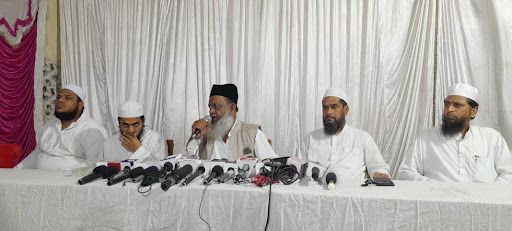
Former Madras High Court Justice Chandru concurred with Rahman’s view that the demolition was meant to send a message to Muslims.
Justice Chandru said the action “smacks of vindictiveness and authoritarian tendencies” and was “a blatant warning to minorities to live under the thumb of the majority”. He said the municipal corporation could not “become a prosecutor and a judge”.
In contrast, when they reported hate speeches against Muslims to the police, they “stalled complaints”, often threatened complainants and did not file FIRs, alleged Rahman. “It has happened dozens of times,” he said.
In 2021, after a doctored propaganda video, police arrested over two dozen Muslims in Ujjain and, accusing them of sedition and invoked the National Security Act, 1980, against them, for allegedly shouting “Pakistan zindabad” during a Muharram procession.
“The whole community was defamed and the media hounded the community. Even kids were not spared,” said Rahman. “But the case fell flat in court.” The court revoked both sections in two hearings, after police failed to authenticate the video.
In the current case, said Alam, the Supreme Court advocate, to arrest the teenagers “at this stage, without any kind of preliminary inquiry” is in violation of the Supreme Court directions in Arnesh Kumar vs Union of India, “which say that reckless arrests should not be made in cases pertaining to alleged offences which have a sentence of less than 7 years”.
Incidentally, these are exactly the guidelines the police rely on, in hate-speech cases, where they are reluctant to arrest perpetrators,” said Alam. “These arrests also point to the executive's arbitrariness of conduct.”
Alam said the point of the music and drums during the demolition was “obviously a show of political strength”. She said, “They are saying that we can do to you at any point of time whatever we like. But that is a political statement, and is absolutely not legal.”
Supreme Court Orders Violated
Used as collective punishment and political capital—state elections in Madhya Pradesh are due in November this year, India’s general elections in 2024—the recent spate of demolitions in north India are unlawful, lawyers Ratna Singh and Areeb Uddin Ahmed wrote in Article 14 in April 2022. These demolitions deny citizens a host of rights, including the fundamental right to be heard. In most cases no notice is served or served as formality, as in Ujjain.
Audi alteram partem comes from Latin and means “Listen to the other side” or “let the other side be heard as well”, wrote Singh and Ahmed. “It is a fundamental legal principle in which each party is entitled to a fair hearing and given the opportunity to respond to evidence against them.”
Arbitrary demolitions not only reverse the burden of proof against the alleged offenders, but also prevent those accused from defending themselves.
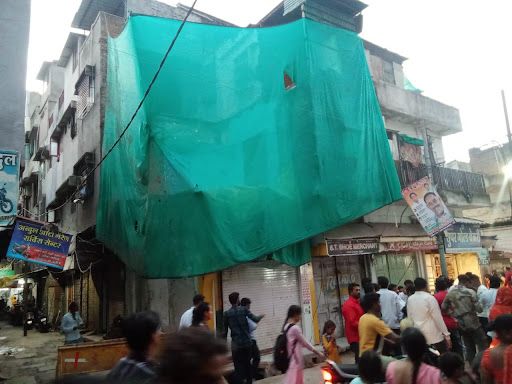
The wave of demolitions disregards landmark Supreme Court judgements in 1985 and 2017, which ruled that evictions and demolitions must: follow clear rules and procedures; include “meaningful” consultation; be “fair, just and reasonable”; and be “consistent with rights of life and dignity”.
None of these directions have been in evidence in the use of bulldozers against alleged and—as we noted—primarily Muslim rioters, with demolitions violating municipal and other laws and, in the case of MP and UP, even special laws promulgated to hasten action against rioters and protestors, as we reported in October 2022,
The first demolition took place in Ujjain under the BJP government on 26 December 2020, a day after clashes between Hindus and Muslims during a donation drive for the construction of the Ram temple in Ayodhya, Uttar Pradesh. These clashes began after provocative slogans outside a mosque. In 2021 and 2023, the homes of Muslim shopkeepers were razed for selling banned manja or glass-laced kite string from China.
The main opposition party, the Congress, has said little about the Ujjain demolition. When contacted, spokesperson K K Mishra said, “The BJP has realised they are losing the government and [are] suppressing Muslims to consolidate their vote bank… voters will teach them a lesson in the next four months.”
Back in Tanki Chowk, Ashraf Hussain said he and his family were struggling to cope with what had happened. They were not currently focussed on the illegality of the demolition.
“Our first priority is to get those innocent children out of jail,” he said. “Then we will think of going to court about the demolition.”
(Kashif Kakvi is a multimedia journalist, covering Madhya Pradesh and Chhattisgarh.)
Get exclusive access to new databases, expert analyses, weekly newsletters, book excerpts and new ideas on democracy, law and society in India. Subscribe to Article 14.

